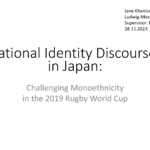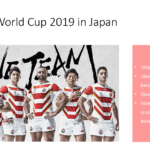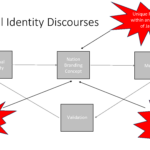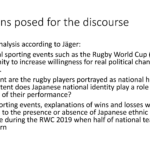
Download
Anmeldung
This is a past event. Registration is no longer possible.
DIJ Mailing Lists
Please subscribe below to stay informed about our research activities, events & publications:
National Identity Discourses in Japan: Challenging Mono-ethnicity in the 2019 Rugby World Cup
28. November 2023
Jane Khanizadeh, LMU Munich/DIJ Tokyo
Large-scale international sporting events potentially trigger national identity discourses. Domestic media attention fosters an increased debate over self-perception and external perception of national identity and thus contributes to the process of nation branding. This highly dynamic period of renegotiating national identity in the spotlight of international attention usually spans over months, starting in the run-up to the event, and stretching all the way to its evaluation in public discourse. The Rugby World Cup held in Japan in 2019 is an intriguing example of an event of such power. The Brave Blossoms, Japan’s national rugby team, is a multi-ethnic team which represented Japan with outstanding success. Their journey through the tournament was broadly covered in the media, and they were cheered on by fans across the country. Their credo #oneTeam was voted to be hashtag of the year 2019 in Japan. Yet, the myth of mono-ethnicity still resonates with some segments in Japanese society. The resulting tension is brought into focus by intensive media reporting and can ultimately lead to a process of redefining a nation-state’s self-perception. Over-emphasized homogeneity of Japanese society is challenged by Japan’s multi-ethnic rugby team. It demonstrates an alternative reality in which athletes of various nationalities and ethnic backgrounds fight together as a team. This team highlights the tension between old assumptions and the reality of a changing society which challenges the discourse of national belonging in Japan. How does this discourse take place? What is considered diverse in Japan and where do national and international reporting clash regarding Japanese national identity?
This hybrid talk attracted an audience of 50 people. The subsequent discussion addressed the question of racism in the discourse on national identity depending on whether the team won or lost its games. It was also discussed how ‚diversity‘ can be defined meaningfully in this context, as diversity may also refer to women or people with disabilities. Finally, the discussion also focused on differences in discourses on national belonging in international rugby and in national rugby in Japan.
Jane Khanizadeh is a PhD student at the Japan Center of Ludwig-Maximilians-Universität Munich. She completed her MA studies in Japanese Studies, Art History and Political Science at the University of Hamburg. Her research interests are discourses on national identity and national belonging in the context of international sporting events. From September to November 2023 she conducted field research in Japan as a DIJ scholarship holder.




